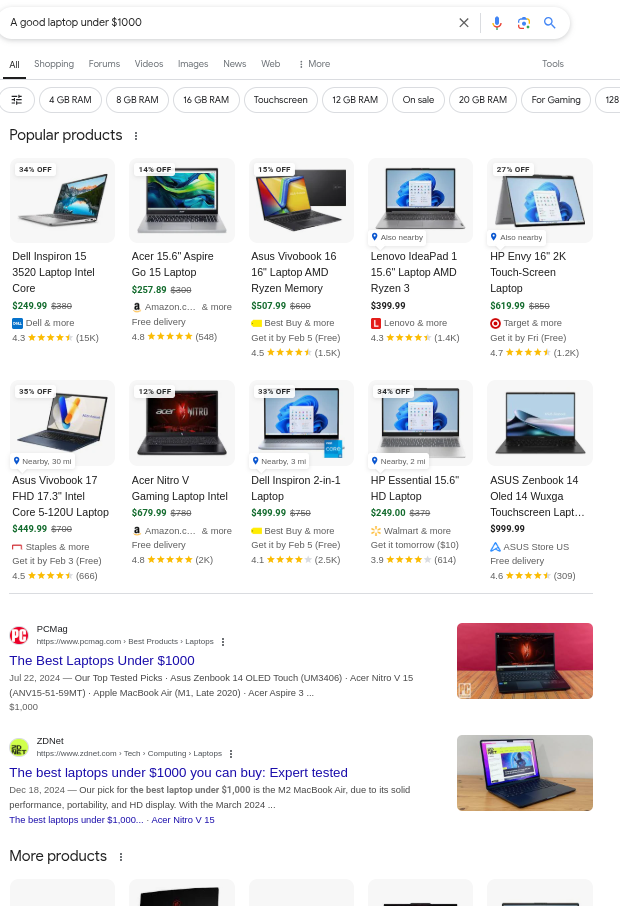Deep Research Review
Farewell to Google Search
Let’s say you were in the market for a new laptop. What would you do? You certainly would not go on Google and search for “A good laptop under $1000”. That’d be madness. It used to be that Google could be a trusted source of information. These days, however, the top results on Google are mostly advertisements.

What Google search results look like
Even if you could find a legitimate review site, you would need to comb through pages of text to gain actionable insight. Doing research like this takes time and can be frustrating. With AI disrupting so much in the past two years, it was bound to disrupt search as well. Thus, entered Deep Research. It changed everything. I no longer use traditional search. If I want information, I go to Deep Research. Every time.
What Is Deep Research?
Google released Deep Research on December 24, 2024 for Gemini Advanced subscribers. It isn’t just an improvement on Google Search. It is a search assistant that:
- Creates a custom plan for your query (e.g., “Find laptops under $1,000”).
- Crawls the web, prioritizing credible sources while filtering out SEO spam.
- Synthesizes findings into a concise report with citations, pros/cons, and actionable recommendations.
There are no ads1. And more importantly, it requires minimal effort from you.
Google Gets Serious About AI Search
Deep Research was a necessary response from Google to AI-powered search engines. ChatGPT showed people the tantalizing possibility of getting answers without seeing ads. It was unsurprising, then, that after ChatGPT was released, we saw a flurry of new entrants into the search market—Everyone was ready to dethrone the king. And they were doing pretty well… Until Deep Research came out. Deep Research is simply way better than competitors like Perplexity and Kagi. Deep Research mimics how humans research: Look at a large number of sources, filter out noise, cross-referencing data, and iterate until the results are good enough. It was the first “agentic” product whose benefits were immediately obvious. Well done, Google!
A New Business Model for Google?
What is interesting is that Google didn’t make Deep Research free. Google had to make a difficult choice on how to monetize this AI killer app. According to The Next Web, Google made $30/month per user from ads2. Deep Research, as part of the Gemini Advanced subscription, costs just $20/month. Is this sustainable? I don’t know. As a user, however, I am happy to pay $20 a month to never see another ad or SEO page again.
The Bottom Line
Google built Deep Research because it had to, and I’m glad it did. The era of typing keywords into a box and praying for honest results is over. With Deep Research, I now have significantly less advertisements and SEO slop in my life.
I should point out that the Deep Research report can still be influenced by SEO slop. If Google looks into it search indexes and finds only contents created by advertisers, the final results will still be flawed. ↩︎
https://www.fool.com/investing/2024/10/24/how-much-does-google-make-in-ad-revenue/ ↩︎